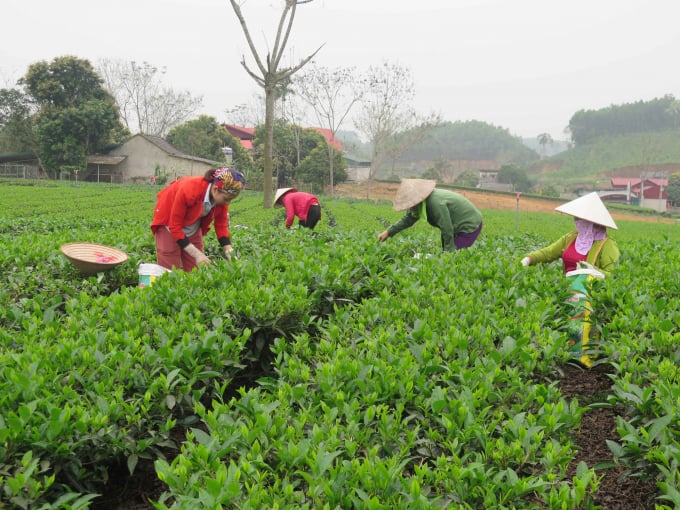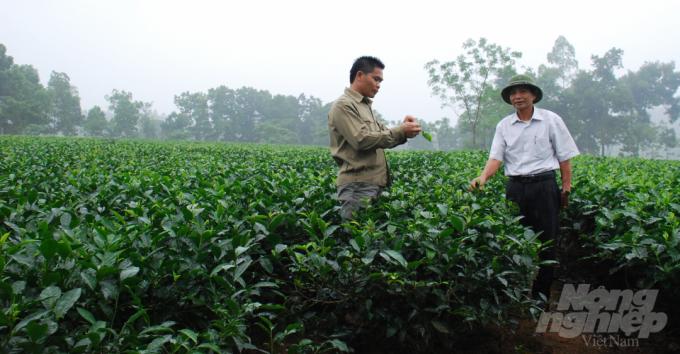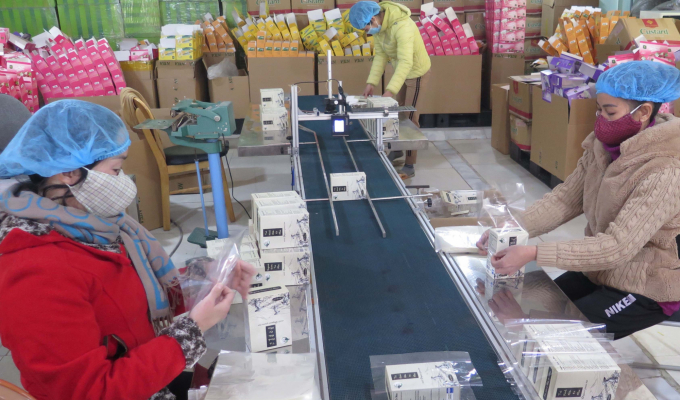November 28, 2025 | 02:50 GMT +7
November 28, 2025 | 02:50 GMT +7
Hotline: 0913.378.918
November 28, 2025 | 02:50 GMT +7
Hotline: 0913.378.918

Harvesting tea in Phu Do commune (Phu Luong district, Thai Nguyen province). Photo: Dong Van Thuong.
Ms. Dao Thi Thoi, Head of the Chinh Phu Organic Tea Production Cooperative Group, Phu Xuyen Commune, Dai Tu District, participated in the study that serves as the core to implement the integrated pest management (IPM) on tea trees from the very beginning.
The IPM skills and methods have helped her become a Tea Cooperative Director, the leader of the organic tea production group following the 11041 standards. One of the IPM principles that have captured her interest the most is the protection of pest’s natural nemesis.
On the tea fields, spiders that eat stink bugs and planthoppers are tea grower's friends, protecting them means protecting the tea plants. At that time, tea growers will not have to use harmful pesticides and worry about the risk of food insecurity. The biggest advantage is that the tea price is always high, and the ecology of tea fields, the health of tea makers and those who use tea products are guaranteed.
IPM on tea plants creates great effects and benefits, but from 2015 onwards, the application of IPM in tea production in Thai Nguyen has not been prioritized as separate programs, but only integrated into other models.

Tea growers in Thai Nguyen have made very positive changes in their production mindset after approaching IPM. Photo: DT.
It can be seen that Thai Nguyen had soon realized the risk of tea plantation recession. Consolidation and rectification of tea production and trading activities through successive schemes on tea has brought Thai Nguyen tea plants, tea products and tea makers to a gradually higher position.
Thai Nguyen is determined to expand the area of safe tea production according to GAP and organic standards in concentrated tea areas. Tea has been selected as a key crop to continue attaining mechanisms and policies to support sustainable development and increase added value.
As shared by Mr. Nguyen Ta, Head of the Plantation and Plant Protection Department of Thai Nguyen province, the application of IPM on tea plants in Thai Nguyen has created a breakthrough effect, serving as a foundation for the implementation and approach safe production procedures.

Packaging tea at NTEA Vietnam Co., Ltd. Thai Nguyen branch. Photo: DV.
According to Ms. Nguyen Thi Nga, Chairwoman of Thai Nguyen Tea Association, the Association is implementing a scientific thesis on traceability and growing area codes for tea products. That will be the basis for Thai Nguyen tea to reach the highest segments in the global tea market.
"The days when tea is a tree for hunger eradication and poverty alleviation have been far gone, so it is unreasonable and impossible to support each and every tea-making household. Support for businesses and cooperatives will ensure the scale of the research as well as the goal of improving the value of Thai Nguyen tea products”, said Ms. Nga.
Mr. Pham Van Sy, Director of Thai Nguyen Provincial Department of Agriculture and Rural Development, stated that instead of spread-out support, Thai Nguyen's agricultural sector will focus its investment resources on key tea areas and typical cooperatives and cooperatives, then expand throughout the province.
Translated by Samuel Pham

(VAN) According to Mr. Vo Minh Thanh, Director of the Tay Ninh Department of Agriculture and Environment, Resolution 57 has created a new development pathway for the locality, shifting from traditional toward modern agriculture.
/2025/11/26/4909-2-154329_878.jpg)
(VAN) Pearl grouper farming in HDPE cages not only delivers economic efficiency but also contributes to protecting the environment, creating jobs, and promoting marine-based experiential tourism.

(VAN) The model of making a living under the forest canopy through the agroforestry system in Van Son commune, Bac Ninh province, is expected to generate an annual income of approximately VND 30 million/ha.

(VAN) Many enterprises in Can Tho are harnessing natural energy and reducing greenhouse gas emissions in their production processes, thereby contributing to the promotion of a sustainable green transition.
/2025/11/24/3536-2-112800_176.jpg)
(VAN) Dong Nai now has tens of thousands of hectares of forests certified for sustainable management, and this area will continue to be expanded in the coming period.

(VAN) Vinh Ha hamlet (Dai Xuyen commune, Hanoi) is shifting away from small-scale farming as households adopt bioscurity into their breeder chicken models.

(VAN) Heavy rains make aquatic species more vulnerable to disease. Proactive water management and high-tech systems help farmers prevent outbreaks and protect yields.